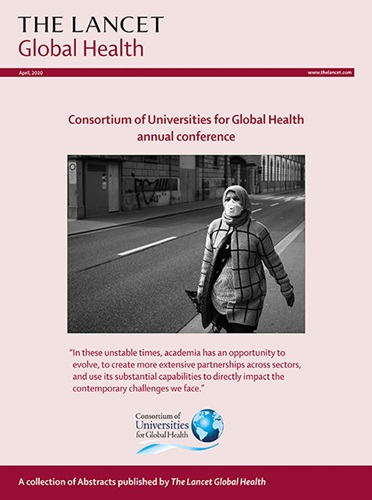Fexinidazole as a new oral treatment for human African trypanosomiasis due to Trypanosoma brucei rhodesiense: a prospective, open-label, single-arm, phase 2-3, non-randomised study.
IF 19.9
1区 医学
Q1 PUBLIC, ENVIRONMENTAL & OCCUPATIONAL HEALTH
引用次数: 0
Abstract
BACKGROUND Rhodesiense human African trypanosomiasis is a neglected disease with epidemic potential that can rapidly become lethal if left untreated. The aim of this study was to show that fexinidazole could offer an alternative to existing treatments (melarsoprol for stage 2 and suramin for stage 1 rhodesiense human African trypanosomiasis), using a benchmark study design. METHODS This was a prospective, open-label, single-arm, phase 2-3, non-randomised study done in two centres (Lwala, Uganda and Rumphi, Malawi). Participants were enrolled if they were aged 6 years or older, weighed 20 kg or more, had parasitologically confirmed rhodesiense human African trypanosomiasis, were able to swallow fexinidazole tablets with a meal, and had a Karnofsky score of 40 or more. Pregnant or breastfeeding women were eligible after the first trimester of pregnancy. While admitted to hospital, participants received oral fexinidazole for 10 days at the recommended dosage according to bodyweight and were followed up for 12 months. The fatality and non-response to treatment rates observed with fexinidazole were compared with predefined rates based on literature. The primary endpoint was the fatality rate at end of hospital admission (EoH) in participants with stage 2 rhodesiense human African trypanosomiasis (considering only deaths possibly related to the disease or fexinidazole), to be compared with 8·5%, an approximation of the fatality rate obtained with melarsoprol. This study is registered with ClinicalTrials.gov, NCT03974178. FINDINGS Between Sept 29, 2019, and Oct 12, 2022, 46 participants with rhodesiense human African trypanosomiasis were screened, of whom 45 were included and treated (35 with stage 2 and ten with stage 1 disease). One death occurred during treatment but was considered unrelated to rhodesiense human African trypanosomiasis or fexinidazole and excluded from the efficacy analysis. No other deaths had occurred by EoH in participants with stage 2 rhodesiense human African trypanosomiasis, giving a fatality rate of 0 (0%) of 34 (90% CI 0-8·43), which was lower than the predefined 8·5% rate (p=0·0488). One participant with stage 2 rhodesiense human African trypanosomiasis had a relapse at week 9. No failures were reported in participants with stage 1 rhodesiense human African trypanosomiasis. No unexpected safety signals were identified on the basis of standard assessments and electrocardiograms. INTERPRETATION Fexinidazole is a safe and easy-to-use treatment, and is a better-accepted alternative to existing treatments for rhodesiense human African trypanosomiasis, such as melarsoprol or suramin. FUNDING EDCTP and various donors through the Drugs for Neglected Diseases initiative.非昔硝唑作为一种新的口服治疗布氏罗得西亚锥虫引起的非洲人类锥虫病:一项前瞻性、开放标签、单臂、2-3期、非随机研究
背景:非洲锥虫病是一种被忽视的疾病,具有流行潜力,如不及时治疗可迅速致命。本研究的目的是利用基准研究设计表明,非昔硝唑可以替代现有的治疗方法(美拉胂醇治疗2期,苏拉明治疗1期罗得西亚人非洲锥虫病)。方法:这是一项前瞻性、开放标签、单臂、2-3期、非随机研究,在两个中心(乌干达Lwala和马拉维Rumphi)进行。如果参与者年龄在6岁或以上,体重在20公斤或以上,患有寄生虫学上确认的罗得西亚人类非洲锥虫病,能够在用餐时吞咽非昔硝唑片,并且Karnofsky评分在40或以上,则纳入受试者。怀孕或哺乳的妇女在怀孕的前三个月后才有资格。入院时,参与者根据体重按推荐剂量口服非昔硝唑10天,并随访12个月。用非昔硝唑观察到的病死率和治疗无反应率与基于文献的预定率进行比较。主要终点是2期罗得西亚人非洲锥虫病(仅考虑可能与疾病或非昔硝唑相关的死亡)患者住院结束时的死亡率(EoH),与8.5%的死亡率(与使用美拉胂醇获得的死亡率近似)进行比较。本研究已在ClinicalTrials.gov注册,编号NCT03974178。在2019年9月29日至2022年10月12日期间,筛选了46名患有罗得西亚人非洲锥虫病的参与者,其中45人被纳入治疗(35人患有2期疾病,10人患有1期疾病)。治疗期间发生1例死亡,但被认为与罗得西亚人非洲锥虫病或非昔硝唑无关,因此被排除在疗效分析之外。在患有2期罗得西亚人非洲锥虫病的参与者中,EoH没有造成其他死亡,死亡率为34 (90% CI 0- 8.43),低于预定的8.5% (p= 0.0488)。一名患有2期罗得西亚人非洲锥虫病的参与者在第9周复发。在患有1期罗得西亚人非洲锥虫病的参与者中没有失败的报告。在标准评估和心电图的基础上,没有发现意外的安全信号。非昔硝唑是一种安全且易于使用的治疗方法,是一种较好接受的替代罗得西亚人非洲锥虫病现有治疗方法,如美拉胂醇或苏拉明。通过“被忽视疾病药品倡议”为该计划和各种捐助者提供资金。
本文章由计算机程序翻译,如有差异,请以英文原文为准。
求助全文
约1分钟内获得全文
求助全文
来源期刊

Lancet Global Health
PUBLIC, ENVIRONMENTAL & OCCUPATIONAL HEALTH-
CiteScore
44.10
自引率
1.20%
发文量
763
审稿时长
10 weeks
期刊介绍:
The Lancet Global Health is an online publication that releases monthly open access (subscription-free) issues.Each issue includes original research, commentary, and correspondence.In addition to this, the publication also provides regular blog posts.
The main focus of The Lancet Global Health is on disadvantaged populations, which can include both entire economic regions and marginalized groups within prosperous nations.The publication prefers to cover topics related to reproductive, maternal, neonatal, child, and adolescent health; infectious diseases (including neglected tropical diseases); non-communicable diseases; mental health; the global health workforce; health systems; surgery; and health policy.
 求助内容:
求助内容: 应助结果提醒方式:
应助结果提醒方式:


